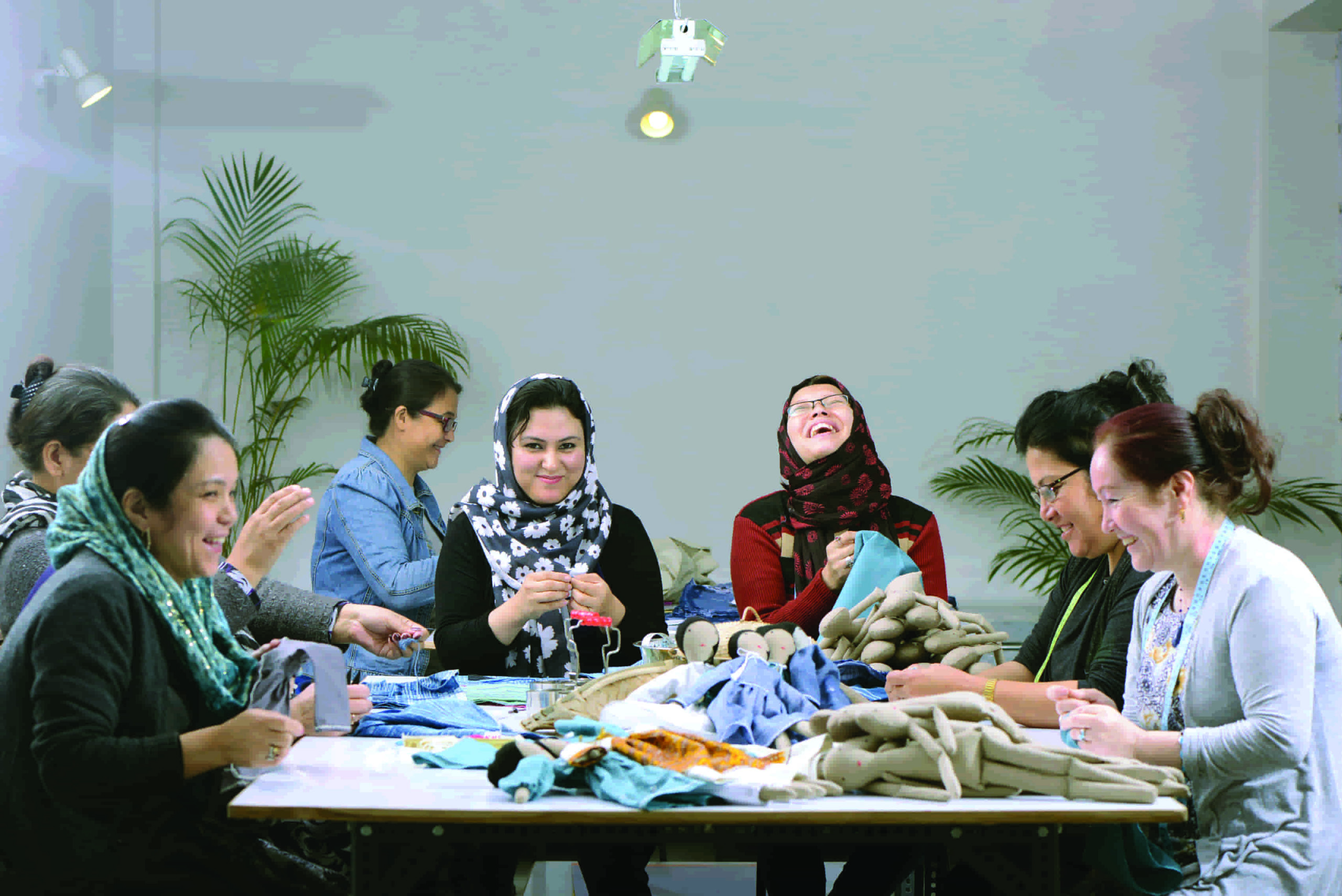
Women from Afghanistan working at Salaiwali are happy to have escaped the Taliban and have settled in Delhi
The Taliban is back in power and the people of Afghanistan, especially the women, are worried about what the future has in store for them. It’s not going to be easy. Some, however, escaped to India many years ago, in quest of a secure life and livelihood, making Delhi their home away from home. And they feel they are lucky, though tormented to have been forced to flee their motherland, they can breathe free without fear for their mortal being.
Their good fortune didn’t end here. They found work in Silaiwali, which was founded in 2018 by Bishwadeep Moitra, a journalist, who was managing editor of the Outlook magazine for many years and his wife Iris Strill, providing livelihood to more than 60 Afghani women in an environmentally friendly and purposeful way.
Bishwadeep explains how this win-win situation was created here at Salaiwali for Afghan women residing in the capital, who are trying to piece together their life with an uncertain future staring at them.
Iris has been training the artisans–women–from Rajasthan and other parts of the country for many years. A few years ago she worked with a group of Afghan women. It was a good experience and she thought of forging a long-term association with them and Silaiwali came into being. The United Nations High Commissioner for Refugees (UNHCR) supported this endeavour and they established a facility in Khidki in South Delhi.
There are two main objectives. First, a lot of waste cloth is generated in Delhi and adjoining areas like Noida and Gurugram in various readymade garment export units here that supply to almost all the leading brands across the globe. The wasted or excess cloth runs into thousands of meters, is collected, and is upscaled here at Silaiwali.
Many items are produced like puppets and “most of the products, almost 99 %, are exported to western countries like Japan and Korea and other parts of the world,” explains Bishwadeep.
This is a wonderful arrangement where refugee women find a source of livelihood by making export items out of waste and excess cloth generated by factories that manufacture export garments. This upscaling not only provides a livelihood to women in dire need but also earns precious foreign exchange for the country. And the whole arrangement is environment friendly and humanitarian in its approach.
There’s a question of trust when it comes to employing people from a different country. Bishwadeep is categorial, “Trust takes time to build and is always mutual. Ek hath se tali nahi bajati.” He elaborates on the long historical association between the two countries, and having worked with women from Afghanistan for three years, he feels that the two countries have a similar cultural milieu and therefore there has never been a cultural conflict in the workspace. He finds Afghan women very honest and hard working. Not just that, his experience has been that the Afghans are polite, which is quite in contrast to the perception created by news and images that emanate from a war-ravaged nation.
“These women run the center,” Bishwadeep minces no words. He and Iris come here and oversee the work, ensuring the designing and production is happening as per the specifications of the orders, but it’s these women who make things happen.
And Saliawali provides the kind of life and security that’s not possible back home, especially after the recent takeover by the Taliban as America makes a quick exit from the country after 20 years.
Shakiba has been living in Delhi since 2013 and speaks fairly fluent Hindi. “I don’t want to go back. I feel safe here in Delhi. The women back home are not treated well,” she says. She describes her ordeal when she had to flee her home town Paro in the middle of the night with the help of her uncle and walked for four hours to reach Kabul. Many girls from her village were picked by the Taliban, she was lucky to escape.
Her sentiments are shared by Shabnam, “The situation back home is grim, there’s no security, no vocation, there’s no life back home,” she says, words come out in quick succession before she breaks down. The news from back home is agonizing, people dying at the hands of Taliban oppressors. “I have not seen them (Tailbans) personally, they are dangerous and dreaded,” she adds. She made a choice long ago, not to live a life in fear, the sense of security and normalcy she experiences here in Delhi is unthinkable back home. The sense of normalcy that the locals often take for granted in this country is a precious commodity. And a large Afghan population residing in various parts of Delhi, particularly in Jangpura and Lajpat Nagar, find them secure, indicative of the great capacity of cosmopolitan Delhi to assimilate various cultures and communities without losing its inherent character.
Police recovered 20 cartons containing 1,000 quarters of alcohol labelled "For Sale in Haryana Only"…
Limited-period offering at Radisson Blu Plaza Delhi Airport presents a carefully sequenced dining experience
the aerial survey was conducted between February 16 and 20 across Khyala, Vishnu Garden, Ranhola,…
Presented by Artisera at Bikaner House, the two-person exhibition brings together Ashu Gupta and Sangeeta…
Unidentified motorcycle-borne assailants fired at a Farsh Bazar house in the early hours; no injuries…
Delhi, placed in Pool H, recorded a commanding 64-42 victory over Tripura. Ashish led from…